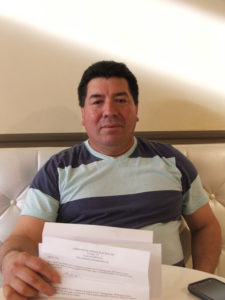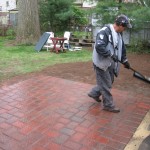CoFiA is pleased to announce that we will be presenting the film, ABRAZOS, at the Leonia Public Library, on Thursday, May 17. The screening is co-sponsored by the Leonia Public Library, the Bergen Countty Immigration Strategy Group, the New Jersey Alliance for Immigration Justice, Grupo Cajola, and United Guatemalans of Morristown. There is still time for other groups to sign on as co-sponsors of this important event.
NEWS
Wage Theft Committee Victory

Our wage theft committee is celebrating the recent collection of a considerable amount of money from a dishonest employer. Mr. M., in the photo, worked hard with the committee to gather the necessary information and create a strategy that worked! While there is still money owed–only $1100 paid out of $1740 owed–the employer has promised to pay the balance next week. The committee will make sure the payment happens and get it to the worker.
Sadly, this kind of exploitation is widespread. Employers take advantage of workers, using all kinds of excuses to justify cheating them of wages earned. Tracking them down, convincing them that wages earned must be paid, and staying on the case until it is settled takes a lot of time and determination on the part of both the committee and the worker.
Thanks!
Saturday group discusses driving licenses
The Saturday Group of CoFiA (delegados) meets frequently at a Guatemalan restaurant in Palisades Park. At this recent meeting the group heard a presentation by Amalia of the current campaign in New Jersey to provide driving licenses for everyone, no matter what their immigration status might be. The group decided this would be their number one issue. Amalia will check with the New Jersey Alliance for Immigrant Justice to see whether they have a standard signature petition form.
The next meeting of the group will be on Saturday, April 21. Reminders will be sent by the CoFiA text blast system.
Hackensack, NJ, policy on immigration
As the Trump administration has pursued a hard line on illegal immigration with an emphasis on arrests and deportations, school districts across the country are adopting policies that officials say will help protect undocumented students and their parents from such enforcement.
The Hackensack school board is the latest to adopt protocols on what school employees must do if they are ever asked to disclose information about students or if Immigration and Customs Enforcement officers comes to one of the district’s schools.
Though the policy aims to allay fears among parents and students, and it states it will give parents or caregivers notice if ICE is looking for their child or requesting records, the policy in effect only reinforces existing practices. Schools are already limited in what information they can collect from students, and ICE officials say agency officers avoid conducting enforcement in schools except under special circumstances, and only after they get approval.
“Immigrant youth will feel comfortable knowing that the school administration, staff and leadership are committed to enhancing their educational experience and are not wasting precious time and resources working with ICE,” said Johanna Calle, a Hackensack school trutsee who pushed for the policy, and is the director of the New Jersey Alliance for Immigrant Justice.
This week, Emiio K. Dabul, an ICE spokesman in Newark, confirmed that the agency designates all schools, including colleges and universities, as “sensitive locations,” places to be avoided unless there is prior approval. The same goes for school activities and school bus stops that are known to officers, though only at times when children are present, according to ICE’s website.
“The policy is intended to guide ICE officers and agents’ actions when enforcing federal law at, or focused on, sensitive locations, to enhance the public understanding and trust, and to ensure that people seeking to participate in activities or utilize services provided at any sensitive location are free to do so, without fear or hesitation,” according to a statement on the ICE website.
Dabul said that ICE does not call schools for student addresses or other personal information.
The policy in Hackensack was adopted nearly two months after some immigrant advocates in Highland Park reported that two Indonesian Christian men had been arrested by ICE officers as they dropped their children off at school. The incident led state Attorney General Gurbir S. Grewal to ask for a review of the arrests, but Dabul, the ICE spokesman, said at the time that they did not take place “on or near school grounds.”
Ed Barocas, legal director of the ACLU of New Jersey, said it’s still unclear where the Indonesian Christians were apprehended. The Hackensack policy, he said, ensures that existing practices are followed.
“It makes sure that in Hackensack that students and their families have some protection, that they feel safe regardless of the whims of immigration authorities,’’ he said.
Calle said that it was important for Hackensack district employees to have guidelines on what to do in case ICE officers show up at one of its schools.
“It’s important to codify because you want to make sure that all staff members are clear on what to do if ICE agents come to schools,” she said. “Sometimes, even a local law enforcement officer doesn’t know what’s required of them.”
If ICE officers show up at a Hackensack school, the policy says they will be permitted to enter school grounds only when required by law, and only after administrators have consulted with the superintendent and the school district’s attorney. School employees must also request a valid judicial warrant, not administrative ones.
Under Hackensack’s new policy, the district will not be allowed to collect personal information from students beyond their age, address and immunization history. The policy states that by limiting the data that can be collected, it minimizes the risk of exposing the immigration status of students or their caregivers.
“The idea would be that we control what kind of data we collect to make sure that we’re not inadvertently putting families in danger,” Calle said.
Existing state law prevents schools from asking students about their immigration status when enrolling in school.
In 1982, the U.S. Supreme Court issued a landmark decision that held that immigrants living in the United States illegally could not be excluded from public elementary and secondary schools based upon their immigration status. New Jersey has instituted its own regulations on the issue, and in 2013 passed a law requiring the state Department of Education to remind school districts twice a year of their obligation to follow federal law by enrolling resident students without asking about their immigration status.
State regulations prohibit school districts from requiring or requesting Social Security numbers; income tax returns; and documentation relating to citizenship, immigration or visa status, except for students who have student visas to study in the United States. U.S. on tuition bases.
School districts have violated the law in the past, drawing legal challenges. In 2014, for instance, the American Civil Liberties Union of New Jersey sued the Butler schools for enforcing a policy that required parents to show a driver’s license or state- or county-issued identification when they registered their children for school. Butler dropped the photo identification requirement soon after the lawsuit was filed.
Calle said nearly 40 percent of Hackensack’s student population are immigrants. She said the policy will help foster trust between residents and community leaders.
Joe Barreto, a former Hackensack school board member and the father of a high school senior, said he was surprised that such a policy didn’t already exist in the district. He said it is necessary because there have been recent reports of ICE officers making arrests in courthouses — a practice that also has drawn criticism. Stuart Rabner, the chief justice of the New Jersey Supreme Court, requested last year that federal immigration officials stop arresting undocumented immigrants at courthouses, saying the practice sends a “chilling message.”
“It just helps add another layer of security for parents and their kids,’’ Barreto said of the Hackensack policy. “I get why they are bringing it up, but I think it should have been done a while ago.”
Barreto said he does not oppose the provision in the policy that requires administrators to notify a caregiver if their child is being targeted by ICE. “If the underlying intent is to kind of help parents, especially those of younger kids, not to have them consumed on a daily basis, and be in fear of coming out of their houses, then I understand it,” he said.
Arrests on immigration violations have risen by nearly 40 percent since Donald Trump became president after running on a platform of expanding immigration enforcement and building a wall on the southern border.
NEED HELP? Call CoFiA
House cleaning? Yard Work? Small Repairs? Painting?
Check out the Community of Friends in Action, Inc., Workers’ Link Program. We help connect local homeowners and small businesses in Eastern Bergen County with workers who need occasional or casual work.
For more information, go to the “Hire a Worker” page on this web site and follow directions. Minimum hours: 4 hour/day. Make requests at least two days in advance. Negotiate hours and wages with workers. Pay promptly!
Let’s Talk: Immigration
The Network for Responsible Public Policy is sponsoring a public forum on immigration on Thursday, April 19th, from 7:30 – 9:30 p.m. at Fairleigh Dickinson University, Dickinson Hall, Wilson Auditorium, 140 University Plaza Drive, Hackensack, NJ. Tickets are $10 and can be purchased online or at the door. RSVP in advance at www.nfrpp.org. Co-sponsored by the League of Women Voters of Northern Valley and of Fair Lawn.
The forum will consider what data tell us about immigration impact on our communities, and the best way forward that honors our history, values and future.
Speakers include Katie Reisner, Senior Policy Advisor to NYC Mayor Bill de Blasio’s Commissioner for Immigrant Affairs; Jeremy Robbins, Executive Director of the New American Economy coalition; and John A. Gronbeck-Tedesco, Associate Professor and Convener of American Studies at Ramapo College of New Jersey.
FILM AT LEONIA LIBRARY May 17, 2018

CoFiA and the Leonia Public Library are presenting a wonderful documentary film, ABRAZOS, on Thursday, May 17th, at 7 P.m. at the library, 227 Fort Lee Road, Leonia. The screening is co-sponsored by the Bergen County Immigration Strategy Group and the New Jersey Alliance for Immigration Justice.
ABRAZOS tells the story of a group of 14 U.S. citizen children who have at least one undocumented parent. The film provides a heart-warming account of their journey from Minnesota to Guatemala to meet their grandparents, and in some cases siblings, for the first time. The film-maker, Luis Argueta, has made several excellent documentaries depicting the realities of U.S. immigration policy and its effect on the lives of families both in the U.S. and abroad. Several CoFiA member families have children who have made similar journeys.
Join us for the film, light refreshments provided by the library, and discussion.
Grant received from Leonia Community Chest


The Leonia Community Chest recently presented a check for $900 to the Community of Friends in Action, representing their generous grant for 2017-18. The Chest has been an ongoing supporter of the work of CoFiA through the years, and we are grateful for both the financial assistance and for the vote of confidence in our efforts.
Vice Chair Carolyn Sobering presented on behalf of CoFiA at Agency Night on March 8.
Cofre comunitario Leonia
El Cofre de la Comunidad de Leonia recientemente presentó un cheque por $ 900 a la Comunidad de Amigos en Acción, representando su generosa subvención para 2017-18. El Cofre ha apoyado continuamente el trabajo de CoFiA a través de los años, y agradecemos tanto la asistencia financiera como el voto de confianza en nuestros esfuerzos.
La Vicepresidenta Carolyn Sobering presentó en nombre de CoFiA en Agency Night el 8 de marzo.
Beware notario fraud
A recent article in NorthJersey.com (Friday, March 2, 2018) alerted the community to a threat by notaries and other unauthorized legal services that is becoming more prevalent.
In Latin America, “notarios” are trained and authorized to handle legal matters. In the US all a notary can do is witness and sign documents. They cannot give legal advice and the most they can charge is a few dollars.
The article cites Casa Freehold director Rita Dentino as saying that the distinction is not always clear to immigrants. Some set up shop in travel agencies or other shops offering immigration services of various kinds for cash.
Lazaro Cardenas, deputy director of the Latino Coalition of New Jersey, is quoted as saying that people who participated in the Coalition’s recent legal clinics for DACA recipients complained of receiving improper services from “notarios”. Here are some tips for avoiding such unauthorized practices.

NOTARIES ARE NOT IMMIGRATION EXPERTS. Members of the immigrant community must be cautioned about the different roles “notarios” can play in Latin America, and the role of notaries in the U.S. People needing such services must find credible lawyers by searching databases of groups like the American Immigration Lawyers Association.
ALWAYS ASK FOR COPIES. Lawyers are required to return a former client’s files on request. Notaries are also required to return a former client’s files
RECEIPTS. Lawyers and other certified immigration experts should be willing to accept checks for their services, or provide receipts. These could be useful if you need to file an ethics complaint about the way a case was handled.
WHERE TO GET HELP. The NJ Division of Consumer Affairs accepts complaints of “notary fraud” on its web site (njconsumeraffairs.state.nj.us/file-a-complaint) or by calling 973-504-6200.
Update on Ravi Ragbir
The following information comes from the New Sanctuary NYC group. Their Executive Director, Ravi Ragbir, has been relentlessly harassed by ICE, which is seeking to deport him. Please let your friends and other concerned citizens know about this opportunity to hear Ravi speak and for all of us to express solidarity with the thousands of immigrants who are experiencing similar treatment.
Hello. We are writing to invite you to join us this Sunday as Ravi delivers a sermon at Judson Memorial Church. Following the service, we will participate in a symbolic ribbon-tying ceremony outside of Judson, to express solidarity with the thousands of immigrants who are incarcerated and hidden in immigration jails, separated from their families, friends, and communities.
We invite each of you to join us this Sunday at 11am.
Updates on Ravi’s Legal Case:
As many of you know, Ravi and multiple organizations filed a lawsuit challenging the targeting by ICE of immigrant rights activists. A hearing was scheduled for March 15th, and Ravi was scheduled to report to ICE for deportation the following day.
We know many of you were planning to accompany Ravi to his court hearing and ICE appointment. The court hearing on the 15th has been postponed. We do not know the new hearing date, but will update you as soon as we do. The stay of removal will remain in place at least until the date of the hearing.
We do not yet know whether Ravi will be required to check in with ICE on the 16th. If he is, it will not be for deportation.
On the 15th, we instead encourage you to attend a rally hosted by the Legal Aid Society and others calling for an end to ICE arrests in courthouses. You can find more information here The flyer is included below.





